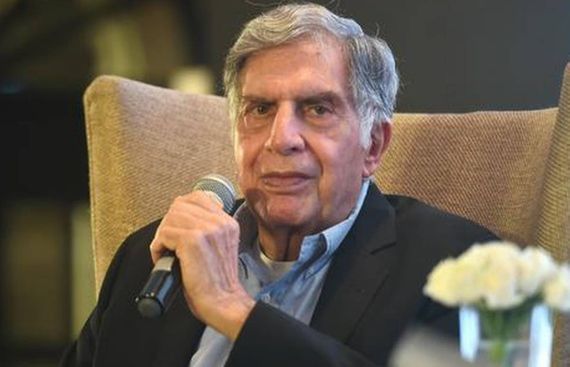Ratan Tata: A Visionary Industrialist

The surname 'Tata' needs no prologue. In fact, Indians use this name to refer riches. The Tata scion has made a huge impact on the corporate world by setting an example for budding entrepreneurs and evolving as their role model. Ratan Tata is celebrated for his exceptional business tactics and managerial ethics. Born in Surat, as the son of Naval Tata and Sonoo on December 28, 1937, Ratan owns his surname as his birthright. Yet, he isn't a direct decedent of the Tatas but was adopted by Navajbai Ratanji Tata.
Agitated Early Days
The riches and luxury, which Ratan was born with, would give us the illusion of his blissful life since his childhood. But, the reality is just its contrary. At a very tender age of 10, Ratan had to witness a harsh reality of his parents parting their ways, and endure the society's negative and ruthless viciousness for his parent's act. Putting up with these issues, Ratan completed his schooling from Cathedral & John Connon School and Bishop Cotton School in Shimla. With the constant support from his grandmother Navajbai, Ratan was able to accomplish his passion of living in the United States by joining Riverdale Country School in New York City and pursued Architecture from Cornell University in 1959.
From a Humble Beginning to the Apex of Victory
Despite being the legal heir of Tata Group, after his graduation, Ratan began his career as a regular employee in his family business, in 1962. Initially, he worked with furnaces along with other workers which in turn has developed humbleness in him and further enhanced the respect he had for his family business. Later in 1971, Ratan was promoted as Director of National Radio & Electronics Company Limited (NELCO). The company was undergoing a bad financial state, thus, to rescue it from a disastrous downfall, Ratan was forced to take charge of it. Despite all the measures taken by Ratan, NELCO could not revive due to dual trouble of economic slowdown and recession. The labor and union strikes fueled the burning fire and disrupted Ratan's efforts.
In 1977, Ratan took charge of Empress Mills (a Tata group company) to restore the mill's deteriorating condition and he also came up with some exceptional business ideas, which were turned down by the other employees of Tata group making the scenario worse. After all the rejection and various rollercoaster rides in Ratan's career came the most awaited moment of stepping in as the leader of the prestigious conglomerate. Thus, in 1991, Jehangir Ratanji Dadabhoy Tata took a bold decision to name Ratan as the Chairman of the Tata Group of Companies. It was indeed a gallant move by JRD Tata to handover such a huge responsibility to Ratan who didn't possess any great experience or exposure to handling this role at that point of time. Eventually, Ratan faced opposition from other heads of Tata Group. But, he proved them wrong and rose to fame by implementing his innovative business strategies.
Under his stewardship, Ratan brought in tremendous changes in the company's management, he fixed the retirement age which ended the period of the most influential leaders of the company. Also, this paved the way for young and energetic talents to enter the Tata Group bringing in innovation. Alongside, he segregated the overlapping operations and streamlined them to enable globalization. Thus, in his 21 years of leadership term, the Tata Group's revenue increased 40 times while profit reached more than 50 times. In addition, Tata Tea acquired Tetley, Tata Motors acquired Jaguar Land Rover, Tata Steel took over Corus. Through these acquisitions, Ratan elevated the Tata Group from being an Indian business to making it a global one, and increased the company's revenue by 65 percent by expanding its operations and sales to more than 100 countries. The business tycoon has observed the struggles of middle-class consumers and came up with his brainchild 'Tata Nano Cars' which are economical hence meets the average Indian consumer's requirements.
Completing his service, Ratan resigned on 28 December 2012 on turning 75 and named Cyrus Pallonji Mistry as his successor. But, citing various issues and disagreement with the board of directors lead to Cyrus removal and Ratan replaced him as the interim Chairman immediately.
Philanthropy
Usually, many businessmen indulge in philanthropy by contribution 10 to 20 percent of their profit as charity. But, Ratan considers himself more as an industrialist than just a businessman. Hence, he prefers the country to grow alongside his business and invests about 60 to 70 percent of his profit in charity and is readily available to take part in social activities, which benefit the nation and its people.
Awards & Honors
The 83-year-old business tycoon is a recipient of two of the country most prestigious and highest civilian awards, the Padma Vibhushan in 2008 and Padma Bhushan in 2000. In addition to these awards, Ratna was bestowed with various other awards for his commendable work and extraordinary contribution to the society.
Ratan is not just famous for his noble works but for his philosophical quotes as well, which would ignite any common man to achieve big. Here is one such quote that hints us to forget things and focus on what we wants to accomplish in our life, "None can destroy iron, but its own rust can! Likewise none can destroy a person, but its own mindset can!"



.jpg)